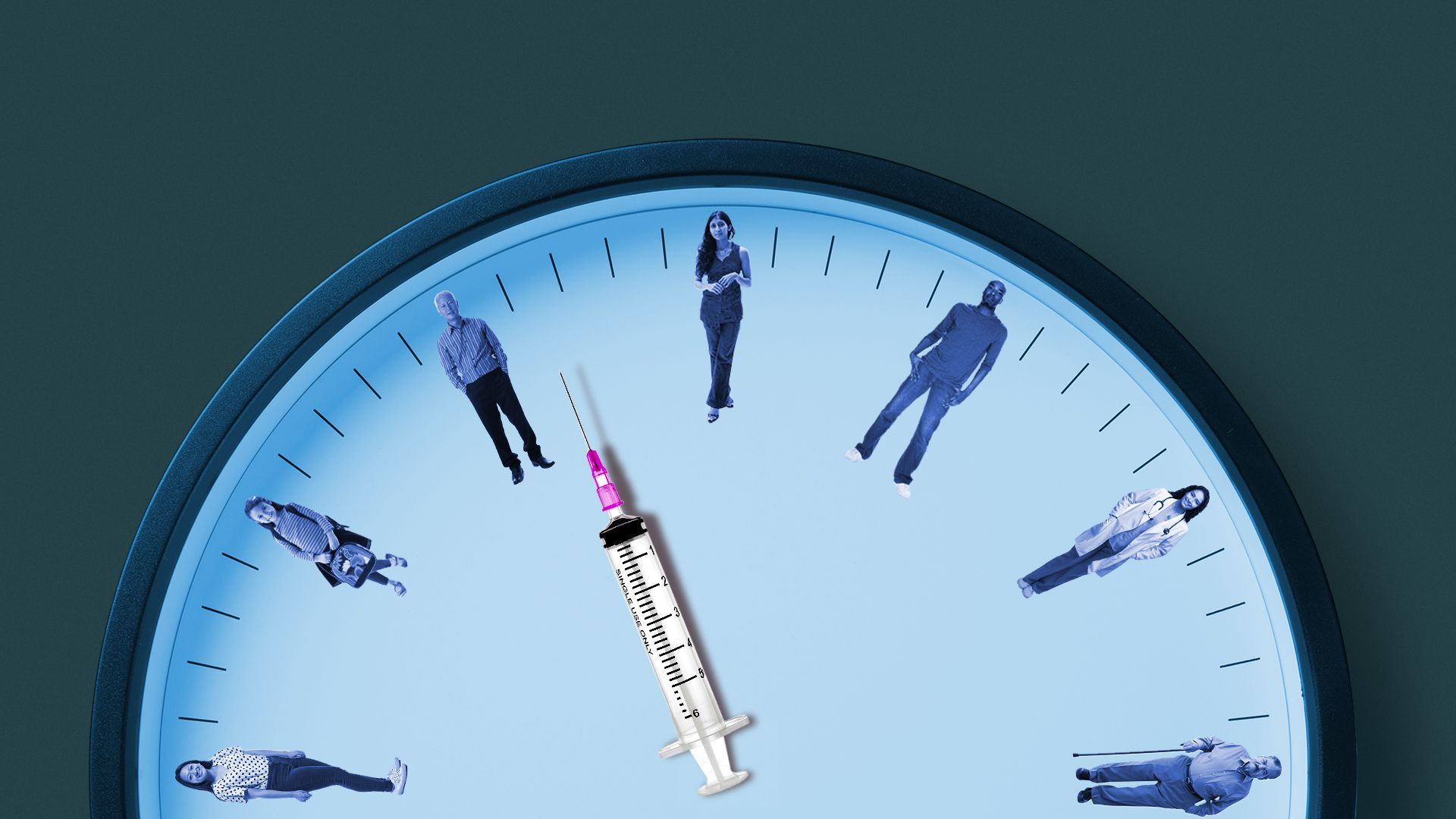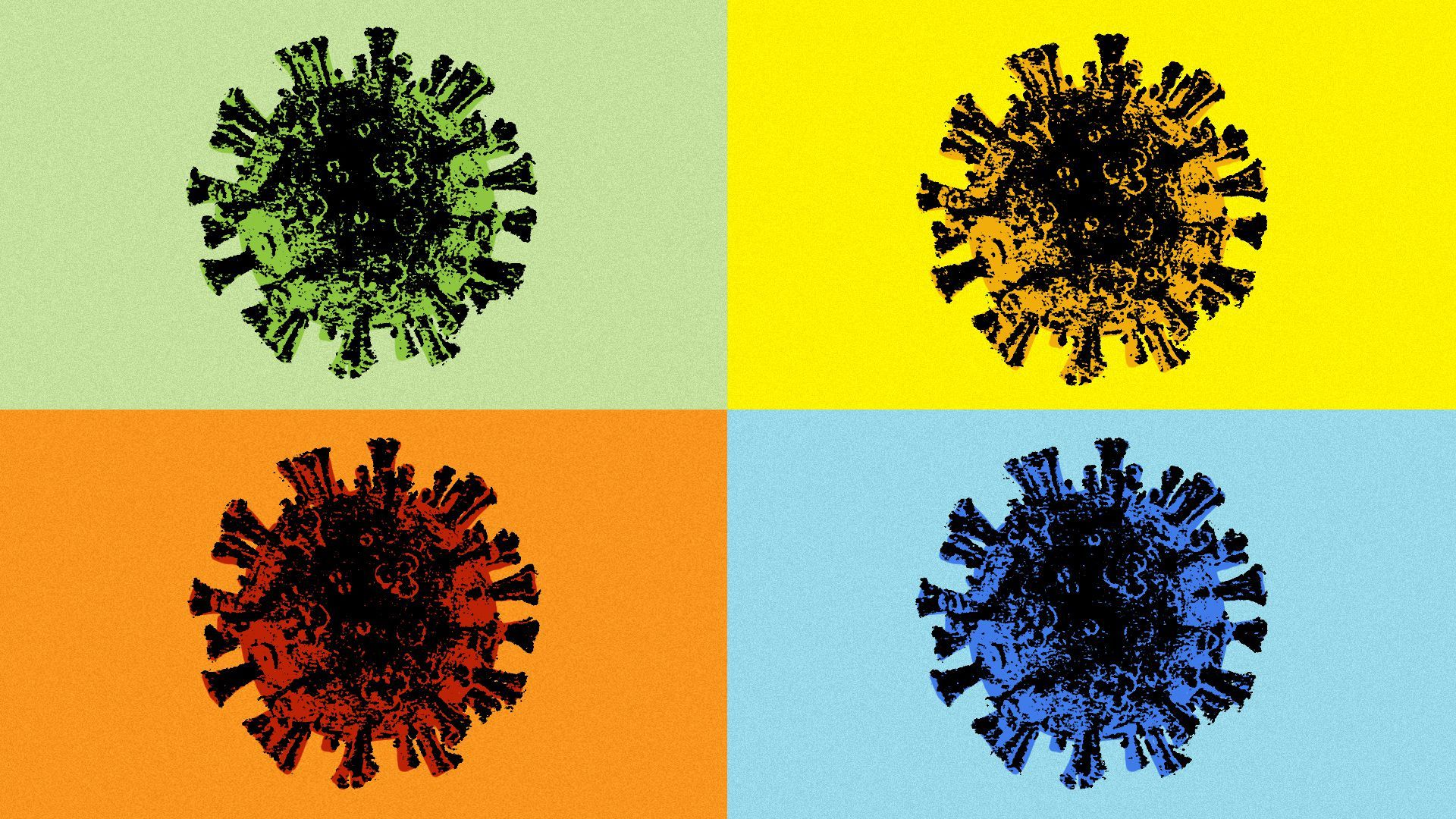| | | | | | | Presented By Coalition for Affordable Prescription Drugs | | | | Vitals | | By Caitlin Owens ·Jan 08, 2021 | | Good morning. We've made it through the first week of the year, if just barely. - I've been thinking a lot over the last couple of days of my friends and colleagues who were in the Capitol on Wednesday, and kept bravely doing their jobs despite the chaos around them. Being a reporter isn't normally life-threatening, and yet when it was, they continued to bear witness to the world the same way they do every other day.
Today's word count is 828, or a 3-minute read. | | | | | | 1 big thing: Why some experts want to relax vaccine prioritization |  | | | Illustration: Annelise Capossela/Axios | | | | Some political leaders and public health experts are rethinking strict prioritization for coronavirus vaccines, suggesting that it might make more sense to simply try to administer as many doses as possible as quickly as possible. Why it matters: Especially while supplies are still limited, there's an inherent tension between trying to focus first on the people most at risk from the virus — including those most likely to spread it — and getting shots into arms at maximum speed. Driving the news: Nationwide, only about 29% of the doses delivered to the states have been administered, according to Bloomberg. - New York Gov. Andrew Cuomo has said he'll propose a criminal penalty on health care providers who don't follow state guidance on who should get vaccines, per Syracuse.com.
What they're saying: "There has to be this change in paradigm from being very, very measured to realizing we're kind of in a warlike situation — we have to move as fast possible," said Amesh Adalja, a senior scholar at Johns Hopkins Center for Health Security. - "It would be much better to move quickly and end up vaccinating some lower-priority people than to let vaccines sit around while states try to micromanage this process," Health and Human Services Secretary Alex Azar said this week, per NBC.
Yes, but: "If you make the system too open to those who are not in priority groups, you run the risk of developing, in a sense, a two-tiered system," said Richard Besser, president and CEO of the Robert Wood Johnson Foundation. The bottom line: "The current logjams do not bode well for protecting those most vulnerable when we move beyond 'Phase 1,'" said Nina Schwalbe, a professor at Columbia's Mailman School of Public Health. Go deeper. |     | | | | | | 2. Fauci: COVID variants threaten some treatments |  | | | Illustration: Aïda Amer/Axios | | | | The COVID-19 variants first detected in the U.K. and South Africa and now circulating globally aren't a current threat to the effectiveness of the first vaccines, but mutations will be closely monitored because "they could be an issue," NIAID director Anthony Fauci tells Axios' Eileen Drage O'Reilly. The big picture: Vaccinations are underway, albeit with a slow start. The get-back-to-normal-goal depends on reaching 70%–85% herd immunity in the population, Fauci says. What's happening: The CDC is monitoring at least two COVID-19 variants that appear to increase transmission of the disease: the B.1.1.7 variant first detected in the U.K., and the 501.V2 variant spreading rapidly through South Africa. - B.1.1.7 doesn't appear to be more virulent or to obviate the effect of the vaccine, based on what British doctors are saying, Fauci says.
But the 501.V2 variant is "a little bit more concerning regarding the possibility of interfering with some of the monoclonal antibodies," based on preliminary findings, he says. What they're watching: Scientists are following the strains and testing them against the vaccines. Go deeper. |     | | | | | | 3. The latest in the U.S. |  Data: The COVID Tracking Project; Note: Does not include probable deaths from New York City; Map: Andrew Witherspoon/Axios The U.S. recorded more than 4,000 coronavirus deaths for the first time yesterday, according to the COVID Tracking Project. Despite the slow roll out of vaccines so far, Fauci says the COVID-19 vaccination campaign will ramp up fast enough that Americans should see "a degree of normality in the fall," Eileen reports. Immunity to SARS-CoV-2 persisted eight months after infection in the majority of people in a study published Wednesday in Science. A CDC model found that asymptomatic carriers transmit more than half of all coronavirus cases, the Washington Post writes. |     | | | | | | A message from Coalition for Affordable Prescription Drugs | | Rebate Rule is the wrong prescription for lower drug prices | | |  | | | | The Trump Administration's prescription drug "Rebate Rule" will raise seniors' premiums by up to 25%, skyrocket government spending, and will not deliver the lower drug costs that patients need. Learn more about why it should be overturned. | | | | | | 4. The latest worldwide |  1. Serbia joined Argentina, Belarus and Russia this week to be among the first countries to approve and administer Russia's Sputnik V vaccine, Axios' Dave Lawler reports. The big picture: Russia has blazed its own course in the vaccine race, relying entirely on a single, state-funded vaccine that was given emergency authorization before much data was available about its effectiveness. - The vaccine's developers say it has a 91% efficacy rate, though that's yet to be confirmed by a medical journal or international regulator.
- Now, Russia is seeking to vaccinate its population while also exporting doses around the world. The government says 1 million Russians have been vaccinated, but it has fallen far behind the number of doses it promised to deliver to cities and regions by now, per WSJ.
2. A coronavirus vaccine produced by Chinese company Sinovac is 78% effective, Brazil officials announced Thursday. 3. Several European countries, including Germany and the U.K., have elected to close schools as part of their new, strict lockdowns amid a brutal third wave of the coronavirus, Dave writes. - Nearly all European countries decided to keep schools open when they entered partial lockdowns during the fall wave.
- Flashback: Western Europe had seemed to turn the tide just a few weeks ago, as their rates of new cases fell swiftly following the new lockdown measures. Now cases are rising precipitously across the continent, and exploding in cities including London.
|     | | | | | | 5. Dog of the week | | Princess. Photo: Mary Scott Manning Yes, we're still doing this in 2021. Meet Princess! - "Princess is a 15-year-old long-haired chihuahua. She was adopted as a puppy from an elderly lady who could no longer care for her, and has been beloved by her family ever since. In the pandemic she got a puppy stroller and has enjoyed rolling around the streets of North Carolina," writes her big sister, Mary Scott.
- Although I have never met Princess personally, I used to live with Mary Scott, and can confirm that she is a very loved pup.
Princess. Photo: Mary Scott Manning Don't forget to keep submitting your dogs! |     | | | | | | A message from Coalition for Affordable Prescription Drugs | | Premiums for seniors will skyrocket under Rebate Rule | | |  | | | | The Coalition for Affordable Prescription Drugs, alongside other concerned organizations, urges the incoming Biden Administration and Congress to protect seniors from higher premiums by overturning this rule and enacting reforms that lower Rx prices. Learn more. | | | | | | Axios thanks our partners for supporting our newsletters.
Sponsorship has no influence on editorial content. Axios, 3100 Clarendon Blvd, Suite 1300, Arlington VA 22201 | | | You received this email because you signed up for newsletters from Axios.
Change your preferences or unsubscribe here. | | | Was this email forwarded to you?
Sign up now to get Axios in your inbox. | | | | Follow Axios on social media:    | | | | | |










No comments:
Post a Comment